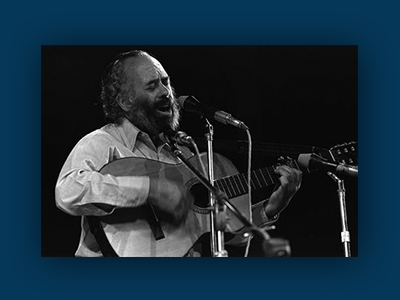
January 14, 1925
Rabbi Shlomo Carlebach, one of modern Judaism’s most influential composers and spiritual leaders is born in Berlin. Carlebach spent his early years in Baden, Austria where his father was the chief rabbi. In July 1938, a few months after the Nazi’s had annexed and entered Austria, Carlebach’s family managed to escape to Lithuania before leaving for New York in 1939 after the Nazis invaded Poland. The family settled in Williamsburg in Brooklyn where Shlomo studied in an ultra-Orthodox yeshiva in Flatbush.
As a student, Carlebach developed an interest in Hasidism and soon became involved with the Chabad Lubavitch movement, traveling to college campuses and performing outreach. In an effort to broaden the appeal of his message and teaching, Carlebach learned to play guitar and began composing songs. The melodies that he composed infused elements of traditional Hasidic niggunim and American folk music. In addition to his outreach and teaching, he began regularly performing in coffee houses in Greenwich Village.
In 1966, he was invited to perform at the legendary Berkeley Folk Festival which included artists Pete Seeger and Jefferson Airplane. He was an instant success and soon after founded the House of Love and Prayer in Haight Ashbury in San Francisco to reach young, disaffected Jews through study, prayer and music.
In 1977, he left San Francisco and moved to Israel, founding a Moshav, Me’or Modi’in outside of Tel-Aviv. He would spend the next seventeen years touring the world performing concerts and continuing to influence Jewish prayer and ritual as well as becoming active in the fight to free Soviet Jewry. He alternated his time between the moshav and New York, where he and his twin brother led the congregation that their father had led. Shlomo Carlebach died in New York on October 20, 1994. He is buried in Israel.
In 1998, allegations of Carlebach sexually assaulting women and minors over decades surfaced in an article in Lillith magazine. Further allegations came out later on. In 2018, his daughter Neshama Carlebach wrote about her father’s legacy in a Times of Israel piece called “My sisters, I hear you.” And in the following year, Yeshiva University’s student newspaper featured an option piece focusing on the need to acknowledge what he had done.
The photo shows Shlomo Carlebach performing in Tel Aviv in 1973.
